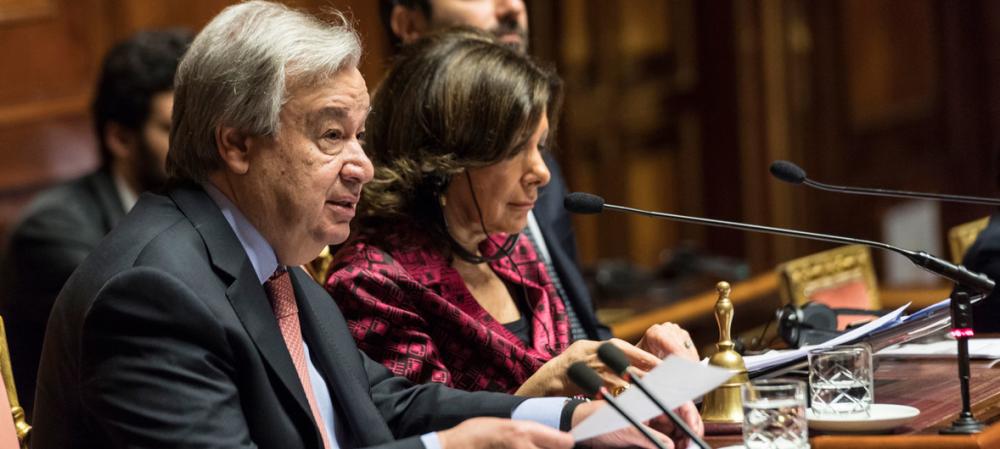Just Earth News | @justearthnews | 18 Dec 2019

New York: Shifting balances of power are triggering “new and dangerous risks”, the UN chief told the Italian Senate in Rome on Wednesday, pointing to the need for more coordinated international responses, focused on solutions.
Against the backdrop of asymmetric conflicts between States and non-State groups and a renewed threat of nuclear proliferation, Secretary-General António Guterres maintained that “prevention is more essential than ever”, and the only path to stability lies in more multilateralism.
He told politicians in the Italian capital that 5 widening fault lines threaten the well-being of all:
We are facing many challenges:
- the climate emergency
- technology used to spread hate speech
- failure of global solidarity with the most vulnerable.
Deeply troubled that refugees and migrants continue to die as they cross seas and deserts, the Secretary-General encouraged “collective responses”, including job programmes which would give young people a reason not to leave home in the first place.
He said migration and resettlement pathways needed to be made more secure.
He also pointed to a “troubling pushback against human rights” globally, including rising misogyny, xenophobia and hate speech, which must be challenged with leadership and political courage, “based on reason and facts”. “Diversity is not a threat but an asset”, he stated.
2. Disconnect between people and planet
Climate-related natural disasters are becoming more frequent, deadly and destructive, with growing human and financial costs, threatening ecosystems, endangering food security, triggering conflicts, and forcing people from their homes.
More political will is needed he said, to stop subsidizing fossil fuels and building coal power plants. Instead, nature-based solutions must be harnessed, with a shift inside developing countries towards adaptation, better disaster response and recovery.
3. Growing economic gaps dividing the world
Unrest around the world in recent months has shown the urgency of moving towards equality, with social and economic systems that work for everyone. People need more of a say in decisions that affect their lives, said the UN chief.
Peaceful, stable societies require equal opportunities and “respect for the rights and freedoms of all”, Mr. Guterres argued, calling for a fairer, more inclusive social contract.
4. Growing technological divide
While new technologies offer tools for peace and sustainable development, they also pose risks, if misused, increasing divisions and adding to exclusion and inequality.
To address this, the UN chief upheld that long-term technology education strategies be put into place along with social protections and flexible regulation frameworks to confront digital challenges, such as a ban on lethal autonomous weapons that “kill without human intervention”.
5. Geostrategic fractures
Guterres stressed the need to preserve a global system with a universal economy that respects international law – “a multipolar world with solid multilateral institutions”.
Multilateralism, links “local actions and urgent global priorities”, he said, elaborating that fighting the climate emergency means advancing peace and social cohesion. Preventing crises means investing in inclusive, sustainable development; and expanding technology access means taking action for gender equality.
Photo caption and credit:
UN Photo/Rein Skullerud
In Rome, the UN Secretary-General António Guterres addresses a special session of the Italian parliament